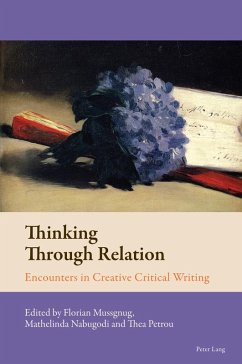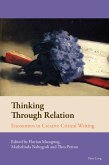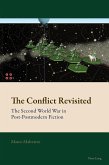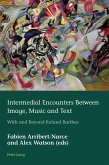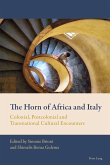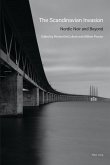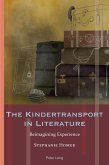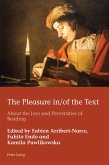«Thinking Through Relation brings together an outstanding collection of essays that explore the diverse ways in which works of art and aesthetic experience generate a richness of relation which escapes the straightjackets of rigid disciplinary and institutional boundaries. Clearly demonstrating the creative potential of critical writing, these essays are a fitting tribute to the creativity, originality and subtlety of Timothy Mathews's scholarly accomplishment and his contribution to our understanding of art and of the aesthetic relation.»
(Dr Ian James, University of Cambridge)
«This book in honour of Timothy Mathews is much more than a Festschrift. It is a collection of thought-provoking, daring insights into the crucial place of literature and the arts in our world and in our being human. It is an exhilarating multifarious demonstration of how creativity can undo, without for a moment losing intellectual rigour, the disciplinary and academic structures that constrain our thinking. Driven by curiosity and by care - love, even - the many contributions to the volume show, in their different ways, how criticism can be at its most effective by being at its most imaginative and its least predictable.»
(Professor Lucia Boldrini, Goldsmiths, University of London)
This book is an offering. It contains eighteen essays in honour of Timothy Mathews, written by leading scholars in the fields of French, Comparative Literature, Visual Culture and Creative Critical Writing. These essays examine the power of serendipitous encounter between artists, thinkers and artistic media as well as the importance of creative interjection in the arts and humanities. They advance fresh interpretations of some important figures in twentieth-century European culture - Apollinaire, Beckett, Benjamin, Calvino, Dalí, Genet, Nooteboom, Roubaud - using modes of reading that are both intellectually brave and open to fragility, intimate as well as critical, at once playful and earnest. They bring texts and artworks into relation in order to amply demonstrate that relation itself is a form of thinking.
(Dr Ian James, University of Cambridge)
«This book in honour of Timothy Mathews is much more than a Festschrift. It is a collection of thought-provoking, daring insights into the crucial place of literature and the arts in our world and in our being human. It is an exhilarating multifarious demonstration of how creativity can undo, without for a moment losing intellectual rigour, the disciplinary and academic structures that constrain our thinking. Driven by curiosity and by care - love, even - the many contributions to the volume show, in their different ways, how criticism can be at its most effective by being at its most imaginative and its least predictable.»
(Professor Lucia Boldrini, Goldsmiths, University of London)
This book is an offering. It contains eighteen essays in honour of Timothy Mathews, written by leading scholars in the fields of French, Comparative Literature, Visual Culture and Creative Critical Writing. These essays examine the power of serendipitous encounter between artists, thinkers and artistic media as well as the importance of creative interjection in the arts and humanities. They advance fresh interpretations of some important figures in twentieth-century European culture - Apollinaire, Beckett, Benjamin, Calvino, Dalí, Genet, Nooteboom, Roubaud - using modes of reading that are both intellectually brave and open to fragility, intimate as well as critical, at once playful and earnest. They bring texts and artworks into relation in order to amply demonstrate that relation itself is a form of thinking.
Dieser Download kann aus rechtlichen Gründen nur mit Rechnungsadresse in A, D ausgeliefert werden.
«Thinking Through Relation brings together an outstanding collection of essays that explore the diverse ways in which works of art and aesthetic experience generate a richness of relation which escapes the straightjackets of rigid disciplinary and institutional boundaries. Clearly demonstrating the creative potential of critical writing, these essays are a fitting tribute to the creativity, originality and subtlety of Timothy Mathews's scholarly accomplishment and his contribution to our understanding of art and of the aesthetic relation.» (Dr Ian James, University of Cambridge)
«This book in honour of Timothy Mathews is much more than a Festschrift. It is a collection of thought-provoking, daring insights into the crucial place of literature and the arts in our world and in our being human. It is an exhilarating multifarious demonstration of how creativity can undo, without for a moment losing intellectual rigour, the disciplinary and academic structures that constrain our thinking. Driven by curiosity and by care - love, even - the many contributions to the volume show, in their different ways, how criticism can be at its most effective by being at its most imaginative and its least predictable.» (Professor Lucia Boldrini, Goldsmiths, University of London)
«This book in honour of Timothy Mathews is much more than a Festschrift. It is a collection of thought-provoking, daring insights into the crucial place of literature and the arts in our world and in our being human. It is an exhilarating multifarious demonstration of how creativity can undo, without for a moment losing intellectual rigour, the disciplinary and academic structures that constrain our thinking. Driven by curiosity and by care - love, even - the many contributions to the volume show, in their different ways, how criticism can be at its most effective by being at its most imaginative and its least predictable.» (Professor Lucia Boldrini, Goldsmiths, University of London)

